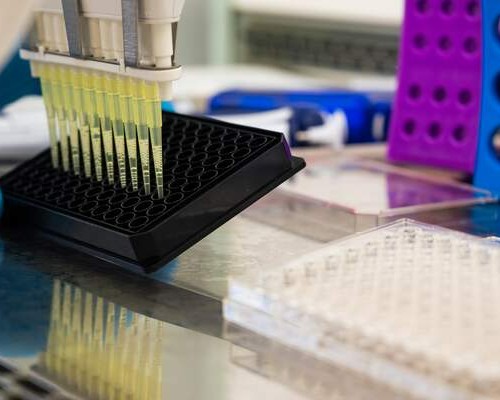University of York launches new centre for blood disorder research
Posted on 11 July 2023
 Medical breakthroughs in clinical care are often underpinned by fundamental biological and epidemiological research.
Medical breakthroughs in clinical care are often underpinned by fundamental biological and epidemiological research.
The new centre will further our understanding of blood cancers and disorders and aims to translate research into the clinical setting - eventually leading to possible new treatments.
It is believed to be one of the first centres in the UK and Europe to bring together expertise in experimental haematology, population epidemiology and clinical settings.
Research funding
The centre, based across the departments of Biology, Health Sciences and Hull York Medical School, already leads a significant research portfolio with more than £22m in active research funding, including grants from Medical Research Council, Cancer Research UK, Bill and Melinda Gates Foundation and Blood Cancer UK.
Blood cancer is currently the UK’s third biggest cancer killer, with over 41,000 people being diagnosed with it every year and unlike most other cancers, it can affect people at any age, from birth through to old age.
The new centre will research the health experiences of the general population and spans the full spectrum – from causes through to their consequences.
The centre’s director, Professor Ian Hitchcock, said any medical breakthroughs in clinical care are often underpinned by fundamental biological and epidemiological research.
He said: “CBR has an ambitious vision to catapult Yorkshire and the Humber to the forefront of blood research.
“It brings together a thriving diverse community of researchers, technicians, administrators, software engineers and PhD students.
“One in every 16 men and one in every 22 women will develop blood cancer at some point in their lives and patients are at the core of what we do - with the ultimate aim of translating our research into the clinic.
“This is an unique opportunity for York and CBR, working together to make a real world difference for patients and their treatments.”
Clinical trials
Professor Adele Fielding is the Centre’s clinical director and has joined the University of York and Hull York Medical School specifically to take up this role. She works on acute lymphoblastic leukaemia throughout the translational research cycle from large clinical trials to basic mechanistic work. She will see patients at Hull University Teaching Hospital.
She said: “I’m incredibly excited to join the team at York. The overall goal of my work is to improve the outcome for adults with acute lymphoblastic leukaemia. By joining CBR, where the three cornerstones of blood research - basic science, clinical trials and epidemiology work together so well, I hope we can move a step closer to realising this goal together.”
University of York Vice-Chancellor Professor Charlie Jeffery said: “In bringing together experts in experimental, clinical and population studies, we have created a unique environment in which to understand the full scope of blood diseases, allowing our team to innovate and create solutions, but to also influence health policy, reduce inequalities, and create a true picture of how people’s lives are impacted.”
Better treatments
Blood Cancer UK’s CEO, Helen Rowntree, said: "Yorkshire is where Blood Cancer UK began, and now we're thrilled to mark the launch of the Centre for Blood Research at the University of York. As researchers delve deeper into how blood cells turn cancerous, we move closer to unlocking better treatments for people with this disease.
“Blood cancer is the UK's fifth most common type of cancer, and includes those living with leukaemia, lymphoma, and myeloma. There are advantages to harnessing commonalities between the diseases and bringing people and research funding together. And with this centre's mission to explore the full spectrum of blood diseases, looking from their origins to their consequences, it will bring us closer to a day where no lives are lost to blood cancer.”
Key facts:
- Blood cancer is the fifth most common cancer in the UK
- It is the most common type of childhood cancer. Every year, more than 500 children aged under 15 are diagnosed with blood cancer. Of these, about 400 have childhood leukaemia and about 100 have lymphoma.
- The risk of blood cancer goes up as you get older, and just under 40% of people diagnosed with it are aged 75 or over.
Further information:
To learn more about Professor Ian Hitchcock's research and career read his 'Research Journey'.
Explore more news

Researchers use robotics to find potential new antibiotic among hundreds of metal complexes
Tuesday 23 December 2025

Text messages could be key to helping TB patients quit smoking, according to study
Monday 22 December 2025

Teenage niece may have shaped Jane Austen’s Persuasion, new study suggests
Monday 22 December 2025

Project to examine how AI is changing the way science is done
Wednesday 17 December 2025

Researcher leads global push to cut tobacco harms in people with mental ill health
Monday 15 December 2025
